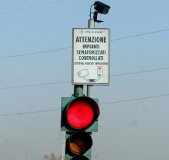1/30/2009
Italy: Red Light Camera Makers Arrested for Fraud Red light cameras shut down across Italy in massive fraud scandal involving 109 public officials and contractors.

Red light cameras are shut down across Italy as the largest ever government investigation into the illegal use of photo enforcement expands. Carabinieri yesterday placed the inventor of the "T-Red" brand of red light camera, Stefano Arrighetti, 45, under house arrest. Another 63 municipal police commanders; 39 mayors and other public officials; and red light camera distributors including Kria, Ci.Ti.Esse, Maggioli, Traffic Technology and Open Software are under investigations. Documents and automated ticketing machines have been seized from 54 municipalities.
Motorist complaints about being trapped at camera-equipped intersections with short yellow signal durations sparked the inquiry. Verona Preliminary Investigations Judge Sandro Sperandio ordered police on January 24, 2008 to seize T-red devices in Tregnago, and the case soon spread across the country to other cities and towns under contract with photo ticketing companies.
Criminal charges of forgery and fraud are based on four basic complaints, many of which represent common practices in the United States. First, municipalities are accused of shortening yellow times to boost profit. Although not binding, Ministry of Transportation guidelines recommend a minimum yellow of 3 seconds for intersections with a posted speed of 50km/h (31 MPH), 4 seconds for 60 km/h (37 MPH) and 5 seconds for 70km/h (43 MPH). Many cameras were placed at high-speed intersections with yellow times as short as 3 seconds. In the US, photo enforcement advocates modified signal timing guidelines beginning in 1985 to promote the use of shortened yellow timing without running into legal troubles.
Second, investigators found that municipal police never reviewed the camera fines. Instead, the tickets went straight to private companies like Ci.Ti.Esse which affixed scanned electronic signatures of police officials before mailing the citations, in violation of Italian law. Camera companies in the US also affix digital signatures to citations that have often never been reviewed by police officials.
The third charge involves fraudulent type approval of the red light camera device. Arrighetti's company, Kria, is accused of having only the T-Red's camera approved by the Ministry of Transportation, not the electronic control hardware that determines who receives a ticket. The same charge has been leveled against Redflex, the Australian company that operates US red light and speed camera systems.
The fourth and most damaging charge involves contracting irregularities. A municipal police commander who helped a red light camera system go from 500,000 Euros in fines in 2005 to $1 million Euros in 2007 received a 2000 Euro (US $2580) bonus from a private company. The no-bid contracts offered to the companies that operate the systems with a per-ticket compensation of 35 percent of each fine issued, while common in the US, violate Italian contracting statutes.
Motorists who have already received fines may apply to the courts to have them canceled.


